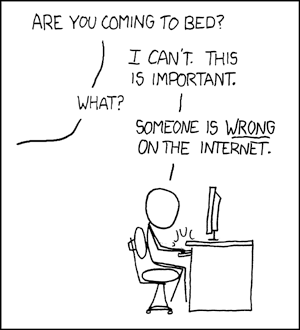Discernment: 6 Questions to Ask (Notes on Discernment)
So you think you see sin in someone’s life. Or you think that something is being taught that isn’t right. What should you do?
I just love this classic cartoon:

Source: xkcd
Yeah, there’s always something wrong, isn’t there? If you want to spend all your time correcting all the horrible errors on the internet, well – – – don’t!
Wouldn’t it be better to spend some time enjoying the Truth?
And yet the Bible does have a lot to say about being discerning, correcting error, helping others avoid sin.
I think that these six questions might help us pause and reflect before we jump into every battle out there…
To evaluate…
- How serious is this error/sin? All of God’s Word is important, but saying that there were 15 tribes of Israel is not the same as denying that Jesus is God.
- How might this affect my community and me? Maybe a strange belief of a sect on the other side of the world just isn’t as urgent to correct as something dangerous that my next door neighbour believes.
- What is my relationship with this person? Frankly, that person in the internet forum likely won’t listen to you the way your best friend will.
To decide…
- How could I/we glorify God in this situation? This isn’t about us, it’s about God first.
- How could I/we protect my/our community and me/us? (not sure how all that grammar works, but you get the idea) If someone is coming at your wife with a knife, don’t discuss morality and the sin nature. Protect your wife first!
- How could I/we help this person? Sometimes it’s only the church that asks this question. Because sometimes this person has sinned against us – in a serious way. Our ultimate goal should not be to prove we’re right, humiliate someone, or even execute justice. When possible, the ultimate goal should be to help – to restore – to forgive. (Sometimes this either isn’t possible for us, or sometimes the path may be through justice, for example. But as God loved us as the “ungodly”, we should do the same.)
What to do?
Neither in my study nor in these internet posts do we really have time to flesh out specific responses. The Bible gives us a lot of guidance here, in situations that are often complex.
Maybe there are times to name someone in public and point out the error. Jesus did it (Revelation 2:20), as did Paul (2Timothy 4:10) and John (3John 1:9-11), among others.
 |
But usually, we’ll be talking with someone in private (see James 5:19-20; Matthew 18:15; Leviticus 19:16-18).
Sometimes, when the issue is small, you may not mention it at all (Proverbs 19:11).
For further study, some passages to start with might be Matthew 18:15-20, Matthew 5:23-26, 2Timothy 2:14-26, and the book of Jude.
